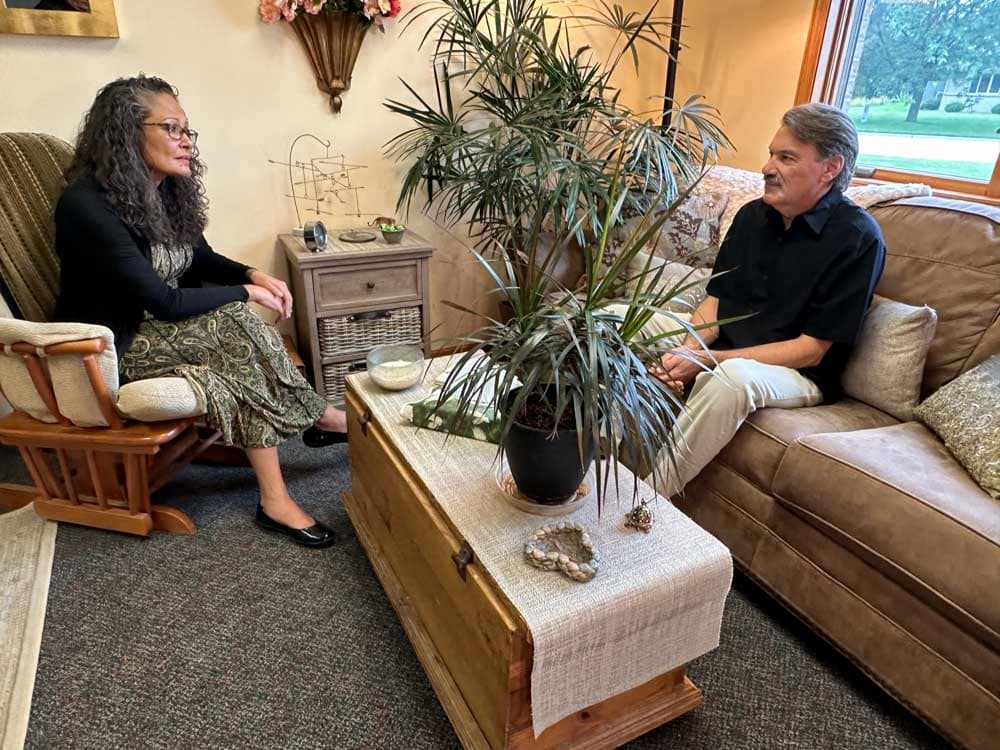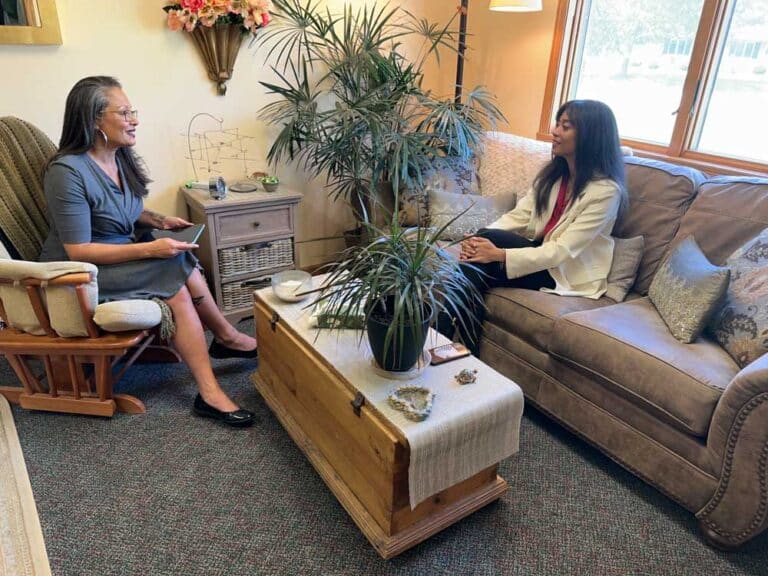Therapy is an investment in yourself, and like any investment, you want to make sure you’re getting the best return.
Whether you’re new to therapy or have been at it for a while, there’s always room to fine-tune to get the most out of every session. While showing up for therapy is great, you can enhance it through engagement, reflection, and making effort in world outside of your therapist’s office. In this post, I’ll help you learn practical tips to help you to optimize your therapy experience so you can make real, lasting changes in your life.
Set Clear Goals from the Start
When you first start therapy, it’s essential to know what you want to get out of it. Looking to manage anxiety? Work through past trauma? Improve your relationships? Perhaps find a greater sense of peace and fulfillment? Whatever it is, having clear goals will help guide your sessions and keep you focused.
Take some time before your first session to think about what you want to achieve. I encourage you to write it down, write it all down, whether it’s one goal or more. And share these goals with your therapist. A quality therapist will work with you to refine these goals and create a roadmap to get there. Keep in mind, therapy is a collaborative process— you and your therapist co-create the path that leads you to achieving your goals.
Be Open and Honest
Therapy can be a safe space where you can be completely yourself, without fear of judgment. But for it to be effective, you need to be open and honest about what’s going on in your life and even in the moment to moment experiences in session. This means sharing not just the big things but also the small details that might seem insignificant but can hold the keys to unlocking the depth needed for transformation.
Being honest also means being upfront about what’s working and what isn’t. If something your therapist says doesn’t resonate with you, let them know. If a certain approach isn’t helping, share that.
Therapy isn’t a one-size-fits-all process; it’s about discovering what works best for you, and that requires open communication.
I always encourage my clients to tell me when I’ve gotten something wrong or if I’m misunderstanding or haven’t connected to them in the way they need. And whoever you end up choosing to do your work with needs to welcome that, too.

Expect and Embrace the Uncomfortable
Therapy can be sooo fucking uncomfortable sometimes. You’re diving into deep, vulnerable areas of your life that you might prefer to avoid. But it’s in this discomfort that the most significant growth can happen. In therapy, we don’t shy away from the tough stuff. A skilled, effective therapist knows how to approach what’s hard at a pace that honors your healing while ensuring care and accountability.
It’s natural to want to avoid pain, but in therapy, leaning into discomfort can lead to profound healing. When you feel resistance or discomfort during a session, use your discernment to see if it’s a sign that you’re getting close to something important. Instead of backing away, we can always meet your discomfort with acceptance and curiosity to see what might be wanting to be seen and cared for.
Do the Work Between Sessions
Therapy isn’t just about the time you spend in the session; it’s about what you do between sessions that counts. Your therapist might give you homework—exercises, journaling, or things to reflect on. Do your best to not skip these. They’re designed to help you integrate what you’ve learned and apply it to your everyday life. And if you do find yourself in a pattern of not doing the homework, share what’s hard about it with your therapist.
Making a habit of reflecting on your sessions can also be enormously beneficial.
Spend time thinking about what came up, what you learned, and how you can use that information moving forward. And if you use that information between appointments with your therapist, let them know! There’s super valuable information to glean to cement your learnings. The more you engage with the process outside of sessions, the more you’ll get out of therapy.
Be Patient with the Process
In our fast-paced world, it’s easy to want quick fixes. I get it. Me, too. I’d like nothing better than quick fixes sometimes. But, as a therapist, I know that real change can take time. In therapy, we work together to rewire old patterns, develop new ways of thinking and feeling, and creating more skillful habits.
I’ll say to my clients that they have had challenges that have been years in the making and we need to give ourselves grace in understanding that healing gets to take however long it needs to take, whether that’s days, months, or years.
Consider practicing patience with yourself and honoring the process. Celebrate the small victories along the way and accept that progress feels slow at times. Trust in the process, and know that every step you take, no matter how small, is bringing you closer to living the life you want to have.
Establish a Strong Relationship with Your Therapist
The relationship between you and your therapist is a wicked important foundation of effective therapy. Studies show that the client-clinician relationship, AKA the therapeutic alliance, is the most important predictor of positive outcomes in treatment. So it’s super crucial to find a therapist you connect with—someone you feel comfortable with, who gets you, and who you can trust. If you’re not clicking with your therapist, it’s okay to seek out someone else. This is your journey, and you deserve to have a guide who’s the right fit for you.
Once you’ve found that connection, nurture it. Be open about your needs, your concerns, and your expectations. The stronger your therapeutic relationship, the more effective your therapy will be.
Stay Committed
Life gets stoopit busy, and it can be tempting to skip a session or two, especially when things start to feel overwhelming. But consistency really is key in therapy. Regular sessions help maintain momentum created in session and keep you moving forward, even when the going gets tough.
Think of therapy as an essential workout for your mind and emotions. Just as you wouldn’t expect to get fit by going to the gym once a month, you can’t expect to see significant changes in therapy without consistent effort. Stay committed, even when it feels hard. Your future self will thank you for it.
Be Kind to Yourself
Therapy is hard work, there’s simply no getting around it. But we can approach this hard work by centering kindness to yourself throughout your process. You’re tackling difficult issues, confronting past traumas, and making significant changes in your life— it takes a lot of your attention and energy.
Give yourself credit for showing up and doing the work, even when it’s challenging I say especially when it’s challenging and celebrate that what you’re doing is changing your very world!
Hold in awareness, progress isn’t always linear. There will be ups and downs, and that’s okay. What matters is that you’re committed to the process and taking steps toward a healthier, more fulfilling life. Be gentle with yourself, and know that every step either forward or backward, can be met with kindness and love.
Use Therapy as a Tool, Not a Crutch
Therapy is an incredibly powerful tool for personal growth and healing, but it’s important to remember that it’s just one facet of an overall well-being strategy. It’s not a magic fix for all your problems, and it shouldn’t be relied on as a crutch.
Use what you learn in therapy to empower yourself in other areas of your life. Develop healthy habits, build a support system, and continue to work on your personal growth outside of therapy. The goal is to use therapy as a springboard for a better life, not as the sole solution to your challenges.

Reflect and Reassess
Finally, take time every few months to reflect on your therapy journey. Are you making progress toward your goals? Are there areas where you feel stuck? Have your goals changed? I regularly check in with my clients to review their goals and identify areas of progress or stuckness. This reflection helps ensure that they’re getting the most out of their therapy and that we’re on the right path.
Please do bring to bring any reflection you have about therapy into your sessions. Discuss them with your therapist and course correct if needed. Therapy is a dynamic process, and it’s okay and, honestly expected, to adjust as you grow and change.
Therapy is one of the most profound investments you can make in yourself, and like any investment, the more you put into it, the more you’ll get out. By setting clear goals, being open and honest, embracing discomfort, and doing the work between sessions, you can maximize your therapy experience and create lasting, meaningful change. With the right approach and the right therapist by your side, you can unlock new levels of emotional well-being and live a life that’s truly fulfilling.








